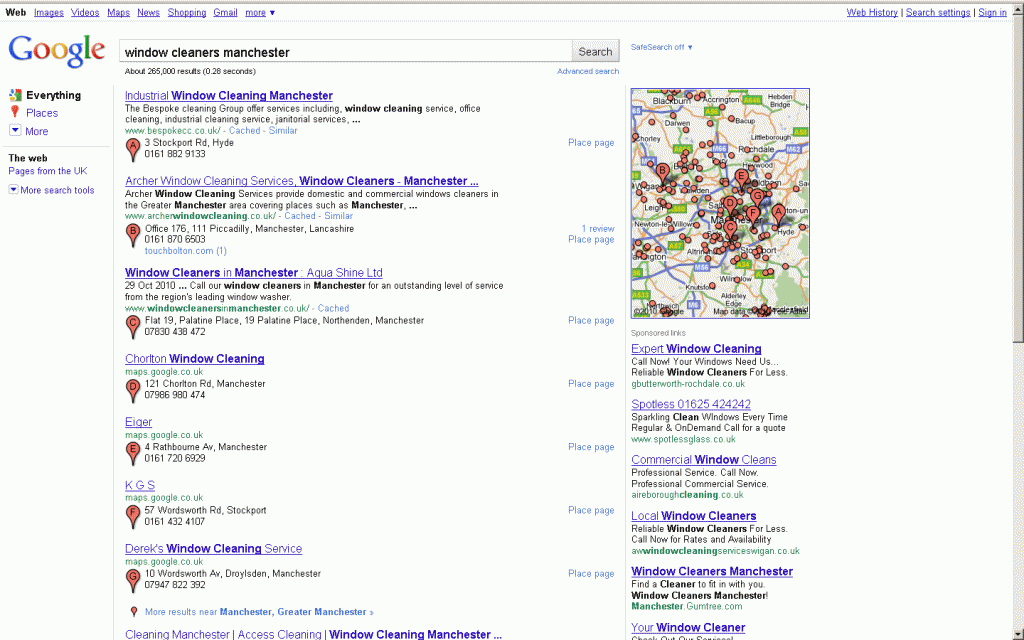Regular users of Google will have no doubt noticed over the weekend that the search giant has made yet another major change to its search algorithm. This time the change has affected local, or geographical, search results.
For example, if you’re searching for services in your local area, such as in Ellesmere Port, Chester or in the Wirral, you’ll now be presented with SERPs that show local businesses in Google Places at the top. Unlike previous results that showed Google Places (formerly Google Business Center) that differentiated the local results from the rest of the organic listings by displaying them separately next to a map, Google’s new SERPs shows the results listed on the page as though they were organic listings.
The result is that any site looking to appear for a geographical search must ensure that it also appears in Google Places, or it could get buried under the weight of Google’s new change, and under the results that have surpassed it.
However, when Google Places was Google Business Center you had to have a physical address at the desired location in order to add your business. This meant that, if you wanted to rank for several different locations such as Chester, Ellesmere Port and the Wirral, you would have needed to register different businesses addresses. With Google Places now taking such prominence at the top of the organic search results, is this still the case?
No, it’s not. Luckily, Google has seen fit to make one small, important change that means you don’t have to go through Google Places like a whirlwind adding your business listing to every perceivable location.
As Jackie Bavaro, the product manager at Google, commented in a recent blog:
“Place Search results will begin appearing automatically on Google when we predict you’re looking for local information.”
“With Place Search, we’re dynamically connecting hundreds of millions of websites with more than 50 million real-world locations. We automatically identify when sites are talking about physical places and cluster links even when they don’t provide addresses and use different names.”
This is good on two levels. Firstly, it means that you don’t need to make multiple listings in Google Places and, secondly, it means that good old fashioned SEO is as important as ever, especially geo-targeted SEO. Search engine optimisation experts must ensure that their clients’ websites are optimised for geographical phrases and locations if those locations are important for the website’s traffic.
Google hasn’t just increased the stakes with regards to geo-SEO, it’s moved the playing field entirely. Do you know how to adapt your SEO strategy?
- Win two hospitality tickets to watch Liverpool v Toulouse at Anfield - September 25, 2023
- Wanted: Web Developer - June 13, 2022
- Facebook adds ‘automatic invitations’ to invite page followers to your group - May 17, 2021




So what are some tips to insure the website shows up in the “places”. Usually they only show 7 Google Places businesses per page – how do you get in the top 7?
How about talking on the fact that the new search results just look awful. At least with the former display you could see the natural results. Either scrap the new way or put them on the side. It’s way too busy and the results aren’t helpful.
Weird question:
Say I’m an online agency selling tickets for travel or events in Paris, France?
Are the searches “Paris opera bookings” or “paris flights” or considered local searches?
Are they local searches because they are geographic?
Or
Are they NOT local searches because the user does not care where the business (shop/agency) is, just where the destination service is?
After all, I might buy flights or accomodation to Paris, France, from an online business based in the USA…
So is “local search” (and the Places Filter) irrelevent here?
Thanks
This is a complete sham. It means that someone spent time and money on their site would not appear on search. Instead some stupid business would be on the first page of search. We need to switch to yahoo or bing.
Most of the address on google place are incorrect.